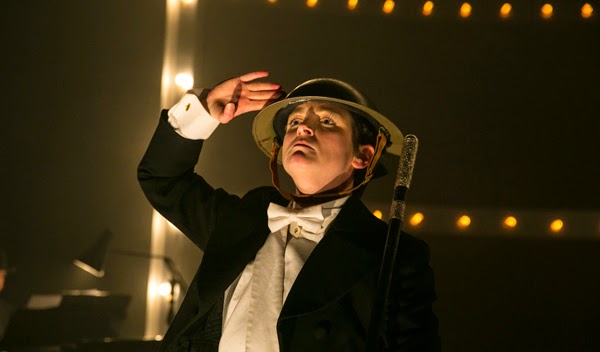'Britain's Best Recruiting Sergeant' review or 'Best foot forward!'
Britain’s Best Recruiting Sergeant, Joy Wilkinson
Unicorn Theatre, 17th February 2015
Goosebumps are a very handy tool
as a critic. Feel them a few times, and you know that a show has got something.
There are a few scenes in Joy Wilkinson’s commemorative play, ‘Britain’s Best
Recruiting Sergeant’, that set the skin tingling. One is when musical hall
singer Vesta Tilley sings ‘Daisy Daisy’ and the past, bound up in that famous number,
comes rushing at us. Another is when, after the outbreak of World War I, Vesta
dons a soldier’s helmet and begins to sing. These are moments that vibrate with
meaning and memory. The rest of the play? Well, it’s a little ploddy to be honest.
The cast of four are also
performing in the Unicorn’s other main play, Brecht’s ‘The Caucasian Circle’.
They seem at ease with each other and there is a nice loose feel to director
Lee Lyford’s no-fuss production, as the actors rummage about for props and
instruments and rattle through a few songs. That’s a relief, to be honest,
because Joy Wilkinson’s script – although very solid and well researched – is a
bit stiff and even a touch patronising in places.
We begin with young Vesta Tilley
(Emily Wachter), aged four and already desperate to join her father Harry (Tom
Espiner) in his Musical Hall act. A narrator – a very glamorous lady in a
bright red dress and sparkling jewellery (Mia Soteriou) – accompanies Vesta on
the piano and frequently interjects with extra information and anxious
predictions. Often, the narrator (who we quickly realise is an older version of
young Vesta) spells out what young Vesta is feeling. It is always a worrying
sign and ultimately a disappointment when a writer feels the need to point out the
emotions in play.
These interjections, and a
general air of ‘careful’ story-telling, slow down the production. We watch
Vesta become a star of the Music Hall and then, as the war breaks out, use her
shows to help enlist young British soldiers. On the eve of the outbreak of war,
the narrator ominously warns us that things are going to turn sour. Well, yes, we
got that! A lovely soldier (Caleb Frederick) spends a lot of time begging Vesta
to come and sing at the front, whilst Vesta preens about on stage. Smoke swirls
about the soldier and he appears behind a gauze screen. What might possibly
happen to him? One can see the plot twists coming a mile off and it sucks the
drama right out of the things. The show is 8 years plus but these kids are
smart. They don’t need to be talked down but sometimes (and this happens so
rarely at the Unicorn) you can feel the script straining very hard to be
simple.
The show and performers are much
livelier than Wilkinson’s hard-working script. There’s a beautiful romance to
Hayley Grindle’s set that reads like a love letter to the theatre. A huge line of
light bulbs frames the back wall of the stage. They remind one of the mirrors
that actors have in their dressing rooms and feel nostalgic and dreamy. When
the War begins, those light bulbs turn harsh and jolting and the dry ice, that
felt magical during Vesta’s performance, turns threatening.
Emily Wachter is a bundle of
charm and energy although, it has to be said, the singing isn’t brilliant in
this production. There are an awful lot of Musical Hall numbers and Wachter’s
voice – bright and colourful as it is – sounds knackered. Same goes for Tom
Espiner, who plays Vesta’s father. Espiner has a brilliant line in waggly
eyebrows and barely-restrained cheekiness but these musical numbers could’ve
been even bigger, brassier and over the top.
Nevertheless, it’s still a
pleasure to see Musical Hall performances on stage – it’s such a rarity
nowadays and is an important part of our performing history. There are some
properly provocative moments too. When Vesta decides to ‘do her bit’ and use
her act to help enlist the soldiers, her performance takes on weird and
sinister edge. The smoke billows about and Vesta, beaming and untroubled,
enthusiastically encourages her audience of young men to sign up for the war.
It is very strange to watch this woman dressed as a chap smilingly nudge these
men towards their graves, her stiff movements just a whisker away from a soldierly
march.



Comments
Post a Comment